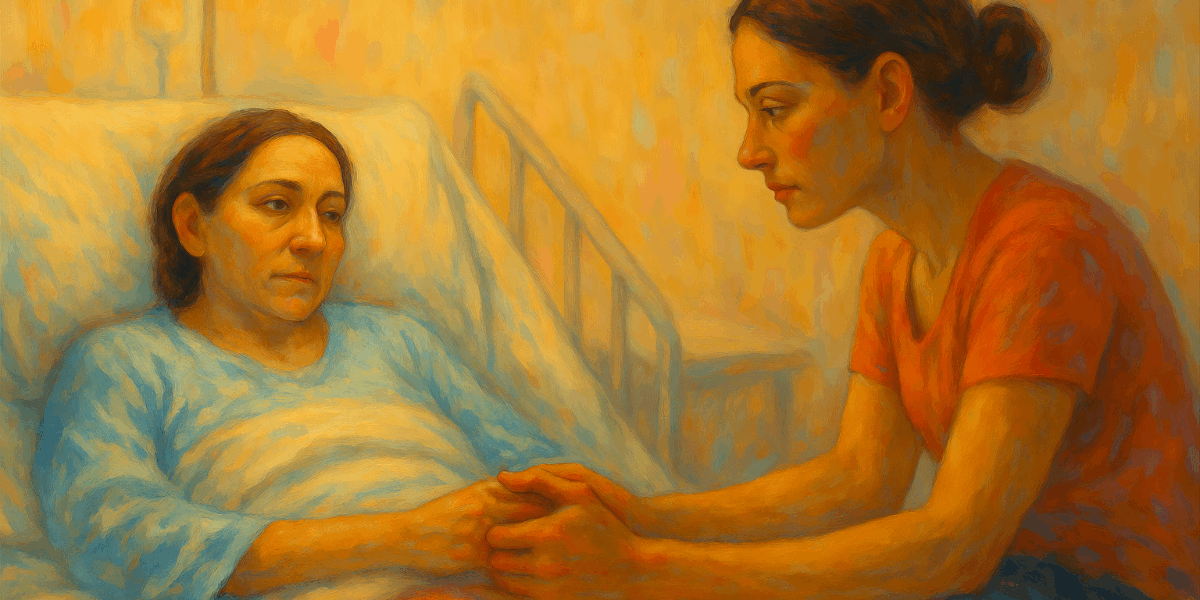Being a caregiver is hard, but being the patient can be even harder.
A friend learned that herself last month when a CT scan found a 15-pound tumor that had been misdiagnosed as an innocuous condition. It was soon removed in a seven-hour surgery, and luckily found to be not cancerous. However, the surgery also required removal of her appendix, spleen, and uterus.
She required a week-long stay in the hospital, and for the next month, she couldn’t roll over by herself or do easy tasks, such as sitting at a desk. Nausea was a constant companion for two weeks, and she required a team of caregivers, including her husband, multiple friends, paid caregivers, and a stepsister who flew into town.
Pain was a frequent visitor, but the experience also brought her a new perspective on both caregivers and their loved ones. Her husband was sleeping at the hospital, rushing home to walk the dog multiple times each day, and trying to find foods she could keep down. He was exhausted and overwhelmed, while she was too helpless to be able to do anything that might help, which added guilt to her health problems.
She said that time seemed to move much more slowly. The first week after surgery felt like it would never end, but, of course, it ended and each week brought new improvements. When moments of depression hit her due to her inability to do anything, she comforted herself with the knowledge that her situation was temporary. Unlike the loved ones of many caregivers, her situation wasn’t permanent, and there was a light at the end of the tunnel for both herself and the many people who had come to her aid.
Here are some insights she gained about caregivers and their loved ones during the experience:
1) Finding the Right Caregiving Fit
Sometimes a paid caregiver, while a wonderfully warm and helpful person, might be a personality mismatch for the patient. When this occurs, it’s vital to address the issue as early as possible by first acknowledging and then resolving the situation through conversation or, if necessary, through a change in caregivers. A patient is already in incredible distress, so it’s worth taking extra time to make sure their caregivers are alleviating that stress, not unintentionally adding to it.
2) Caregiving Can Be a Challenging Skill
For her family and friends, caregiving was both new and a bit confusing. They were worried about her health, wanted to help, and yet often didn’t know how to do so. Often there was nothing they could do but wait, which could feel harder than actually doing something. At least when a problem emerged, they had a task that they could tackle, even if it also was tiring to keep up with everything. Throughout the process of learning new roles, everyone found it beneficial to maintain as much patience and compassion as possible for each person’s struggles.
3) Getting Through Boredom
During her recovery, my friend’s days crept by in a long, boring, and frustrating mix of pain and nausea. She became tired of watching television, but there was little else she could manage. Even chatting with a visitor could activate her nausea. Still, it was nice to anticipate a planned visit from friends and family or know when a doctor’s appointment would happen. Those visits and outings provided motivation. If a friend was visiting, she was happier to go through the discomfort and stress of getting ready, and the visits provided a boost to her morale and helped her cope.
By the end of her journey, she felt she had not only successfully gotten rid of the tumor weighing her down, but had also learned new appreciation for how difficult it can be to both care for someone else and be the one needing that care.
Thank you for reading, please share with a friend, and be well. —KK
We are grateful to have been helping caregivers in need for over 10 years thanks to the support of the many generous and caring friends who have helped make a difference in so many lives.
Please consider donating to the Kathi Koll Foundation so you can help make a difference in struggling family caregivers’ lives. Thank you!
Hero image generated by Microsoft Copilot AI


